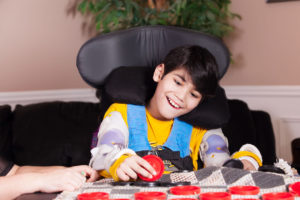Occupational Therapy for Cerebral Palsy
The goal of occupational therapy is to help cerebral palsy patients increase their motor skills and self-esteem. Practitioners of this form of therapy seek to help cerebral palsy patients gain a sense of independence and control over their lives.

Occupational Therapy for Kids with CP
Occupational therapists combine experience from several different areas of expertise to help a person with cerebral palsy function as effectively as possible in daily life.
One of the skill-sets that occupational therapists work on is motor skills. Occupational therapists may work with the child to improve handwriting and hand-eye coordination skills, such as swinging a bat or moving a computer mouse. Some occupational therapists focus on helping children with sensory issues, developmental disorders, or those who may have a hard time feeding themselves or taking a bath without assistance.
While eating, brushing our teeth and getting dressed are simple for non-disabled people, obviously these tasks can be considerably more difficult for a person with cerebral palsy.
What to Expect with Occupational Therapy
An occupational therapist evaluates the physical challenges that a person with cerebral palsy has which inhibit functional living. By assessing the skills a disabled person needs to function in school, work, at home or in social situations, an occupational therapist can develop a therapy plan.
Each therapy plan is tailored to the child’s specific needs and skill level. The therapist helps the child learn ways to get around the challenges of everyday life. For example, if a person has difficulty in holding tooth brush to brush their teeth, special grips can be added to the handles to make it easier to hold. Getting in an out of a car requires a special order of movements for people with cerebral palsy. An occupational therapist helps the victim learn the required movements, and practice until they accomplish the task to the best of their ability.
Sometimes, behavioral therapists will focus on helping children who have behavioral issues. These therapists will help the children learn how to better manage their emotions.
Occupational therapists can also help evaluate children for equipment, such as wheelchairs, braces, or even special dishware.
Occupational therapy is an excellent form of treatment for children with cerebral palsy. Not only does it increase day-to-day living skills, but it also increases a child’s sense of confidence and self worth.
